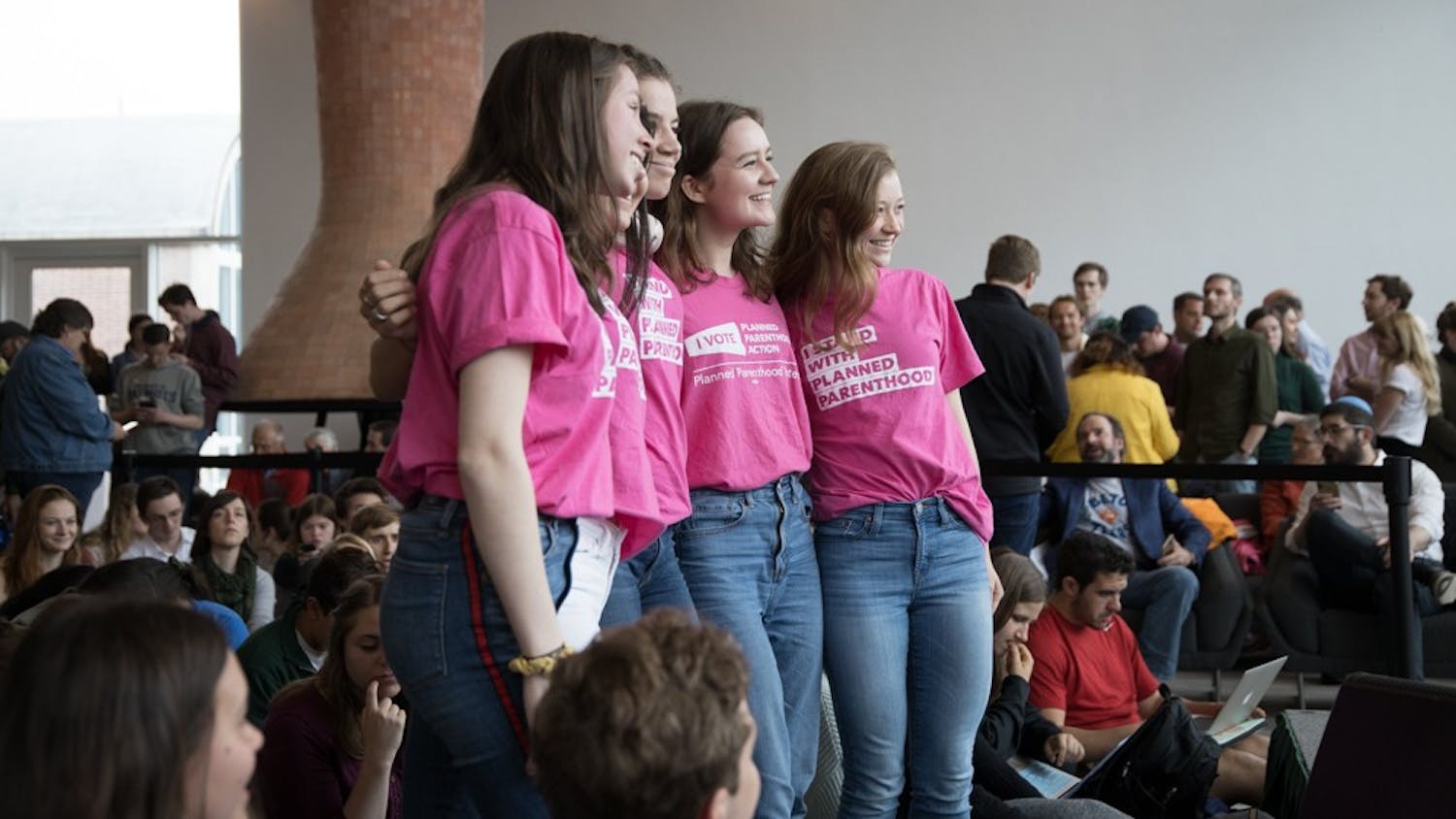Following one of the most divisive elections in recent memory, the 2020 presidential election looks to be a critical moment for American politics. One month ago, The Dartmouth conducted a poll recording the political and ideological views of Dartmouth’s student body. Now, after the first round of debates in the highly competitive Democratic Primary, we present some of its results.
Dartmouth remains left-leaning
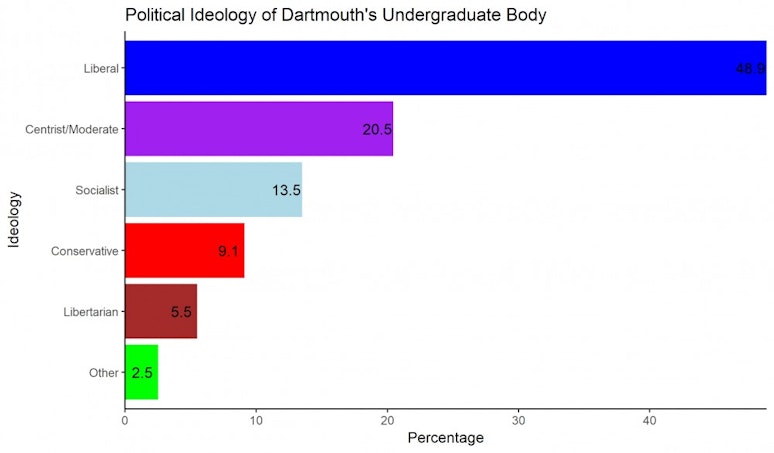
Nearly half of Dartmouth students consider themselves liberal.
Students at Dartmouth remain generally left-leaning. Almost half (49 percent) of Dartmouth students identified themselves as broadly liberal and a further 13 percent identified as socialist. Twenty percent of students reported being moderate, while nine percent of students identified as conservative and six percent of students identified as libertarian.
These liberal advantages revealed themselves in Dartmouth students’ party affiliations. A majority (59 percent) of students identified with the Democratic Party, while one-quarter (25 percent) identified as independents and 13 percent identified with the Republican Party, while 2.4 percent identified with the Libertarian Party and one student identified with the Green Party.
Among all current candidates, Elizabeth Warren generally held an edge at Dartmouth, with 17 percent of the student body reporting that they would have voted for her if the election were held at the time of the poll. Warren was followed closely by Biden (14 percent) and Sanders (12 percent), with Buttigieg (11 percent), Harris (11 percent) and Trump (nine percent) behind.
Warren’s lead comes from her strong leftist appeal: 24 percent of students who identified as Democrats said they would vote for Warren, while only nine percent of independents and no Republicans offered her their support. In comparison, Biden drew support surprisingly evenly from across the political spectrum: 22 percent of Libertarians and 15 percent of independents supported Biden, while 14 percent of Democrats and 13 percent of Republicans supported him. Thirteen percent of Democrats and 16 percent of independents supported Sanders, though he received no support from Republicans or Libertarians. Trump’s support came almost entirely from the right-wing, with a majority (64 percent) of Republicans supporting him. Trump also had the support of four percent of independent students and a lone Democrat student.
Increasingly polarized views
As an indicator of political divisions in everyday life, students were asked how comfortable they would be being in a relationship with someone who opposes their political views. Overall, 42 percent of students said they would be either somewhat comfortable or very comfortable being in a relationship with someone of opposing view, while 48 percent of students said they would be somewhat or very uncomfortable doing so. Republican students tended to be the most outgoing, with 81 percent reporting they would be very or somewhat comfortable being in a relationship with someone of opposing view; only 27 percent of Democrat students had the same view.
Students were also asked about their stance on specific issues, which also received largely divided responses. When asked whether the United States should move towards a more socialist economic system, a slight majority (51 percent) said that they would somewhat or strongly agree, while 33 percent said that they would somewhat or strongly disagree.
Universal basic income is an increasingly popular economic policy proposal, which would provide every citizen in the United States with a periodic cash payment without a means test or work requirement. Dartmouth students were found to be generally in favor of the idea, with 53 percent either somewhat or strongly supporting a basic income policy and 26 percent either somewhat or strongly opposing the policy. Six percent of students reported not knowing what a basic income policy is. Although some supporters of the basic income policy tout it as a bipartisan approach to welfare reform, support at Dartmouth was strongly divided by party lines. Although 57 percent of Democrat students and 45 percent of independent students supported the idea at the time of the poll, a mere four percent of Republican students supported a basic income.
Although students were divided on many specific issues in American politics today, students are generally united in their faith in U.S. political ideals. When asked about the role of democracy in the political system, 78 percent of students reported democracy as very essential for United States politics and a further 18 percent report democracy as somewhat essential for politics. Only two percent of students report being unsure and two percent of students find democracy somewhat or very unnecessary. Overall, Democrat students hold the most faith in democracy, with 99 percent finding democracy either somewhat or very essential; 93 percent of Republican students hold the same opinion.
Students’ views on President Trump
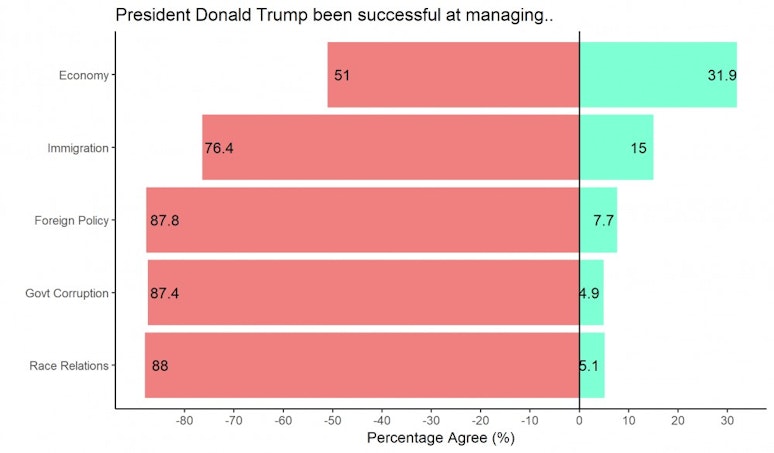
88 percent of Dartmouth students indicated that they disagree that President Donald Trump has been successful at managing race relations.
The Dartmouth student body was highly opposed to President Trump, with 12 percent approving of his job performance and 88 percent disapproving. Non-Republicans overwhelmingly disapproved of Trump: 86 percent of Libertarian students, 92 percent of independent students and 99.7 percent of Democratic students felt negatively about Trump’s time in office so far. On the other hand, 76 percent of Republican students approved of Trump’s performance as president.
When asked about specific aspects of Trump’s job performance, Trump’s handling of the economy was most supported by students overall. Nine percent of students strongly agreed that Trump has been successful in managing the economy and 23 percent of students somewhat agree. However, Trump’s perceived success in each of the other categories was noticeably more negative. Only 15 percent of students somewhat or strongly agreed that Trump has been successful in changing immigration policy, and seven percent of students strongly or somewhat agreed that Trump has been successful in handling foreign relationships. Trump’s handling of race relations and his handling of government corruption fared the worst, with only five percent of students strongly or somewhat agreeing that he was successful in each of these areas.
Although Dartmouth students overwhelmingly did not support Trump, they were divided on whether Congress should begin impeachment proceedings. Forty-six percent of students somewhat or strongly agreed that Congress should begin impeaching Trump, while 36 percent of students somewhat or strongly disagreed and 18 percent of students had no strong opinions either way. Democrats and independents held the strongest opinions, with 56 percent and 44 percent in support of impeachment, respectively; only 10 percent of Libertarians and one percent of Republicans believed that the impeachment process should be started.
Additionally, despite their general dislike for Trump, students felt that he had a good chance to win re-election. Fifty-five percent of students felt that it was somewhat or very likely that Trump would win again in 2020, while only 24 percent of students felt that it was somewhat or very unlikely. Republicans were the most optimistic, with 88 percent of Republican students finding it somewhat or very likely that Trump would win again.
Students prefer young candidates
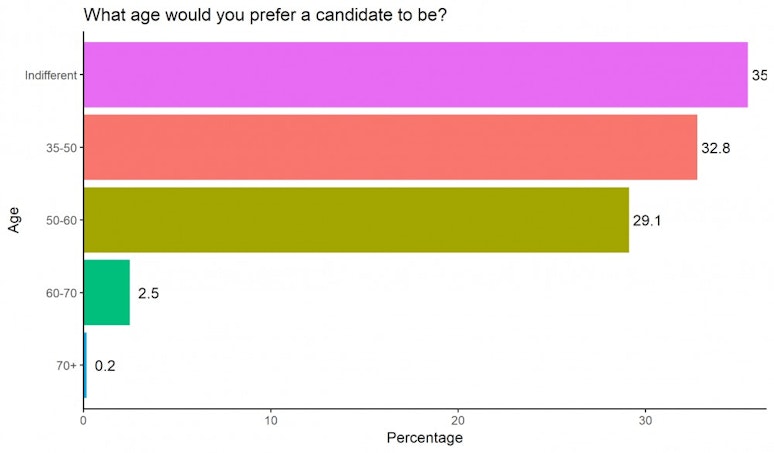
Dartmouth students prefer candidates 50 or younger.
Students found age to be a somewhat important factor in determining their support for a candidate. Forty-nine percent of students agreed that age would be a significant factor, while 31 percent of students disagreed. For students that felt age is an important difference, younger candidates were strongly favored. Fifty-one percent of students said they would prefer a candidate younger than 50 years of age and a further 45 percent preferred a candidate no older than 60. Considering the fact that several of the candidates in this election are older — Biden, Sanders and Trump in particular — the preference for younger candidates may become a relevant factor in the election.
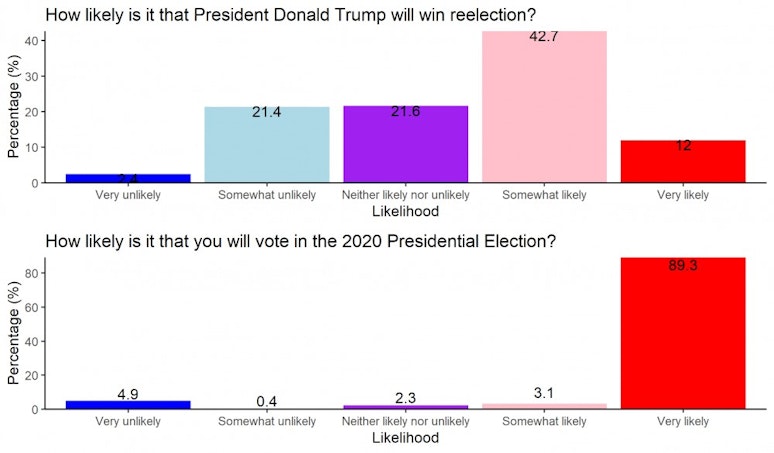
89.3 percent of Dartmouth students indicated that it is "very likely" that they will vote in the 2020 presidential election.
Overall, Dartmouth students were found to be very enthusiastic to participate in the upcoming election. Eighty-nine percent of students reported being very likely to vote in the upcoming election and a further three percent reported being somewhat likely to vote. Those affiliated with a party were especially likely to vote, with 93 percent of Democrats and 94 percent of Republicans reporting being very likely to vote in 2020. Independents lack the same anticipation for the next election: A smaller (though still overwhelming) majority, 79 percent, of students without party affiliation reported being very likely to vote.
Methodology
From Monday, May 13 to Saturday, May 25, The Dartmouth fielded an online survey of Dartmouth students on their political and ideological views. At that time, Michael Bennet, Steve Bullock, Bill de Blasio and Joe Sestak had yet to announce their intention to run in the election. The survey was sent out to 3,910 students through their school email addresses. Three hundred and twenty-one responses were recorded, resulting in a 8.2 percent response rate. Using administrative data from the College’s Office of Institutional Research, responses were weighted race/ethnicity and graduation year. Weighting was done through iterative post-stratification (raking). Survey results have a margin of error +/- 5.24%.

